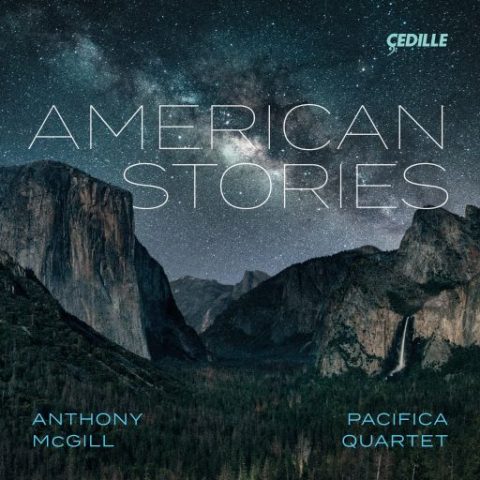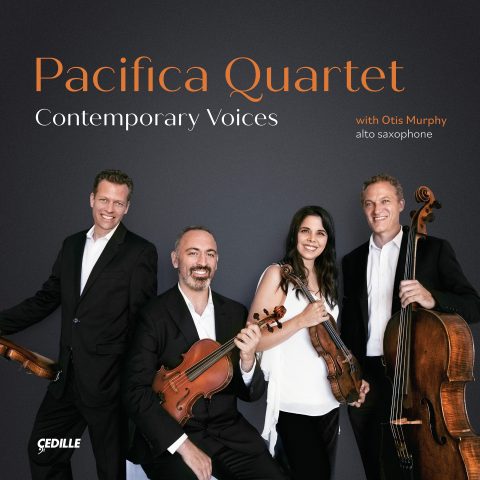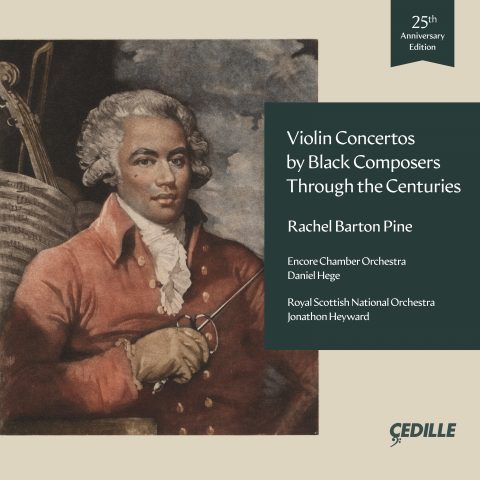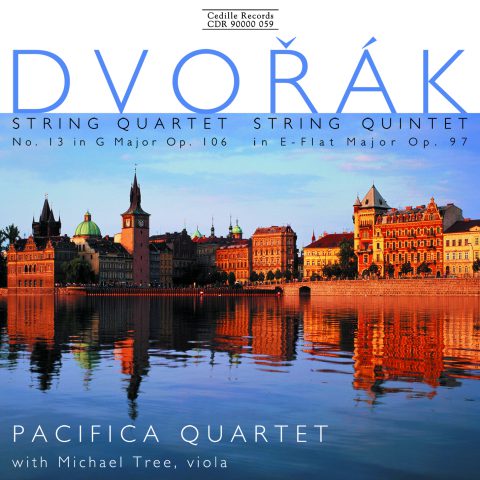| Subtotal | $18.00 |
|---|---|
| Tax | $1.85 |
| Total | $19.85 |
Store
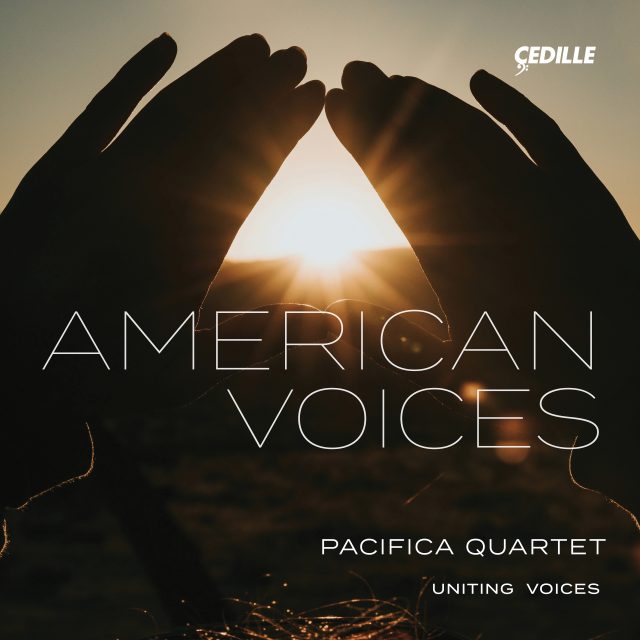
The multiple Grammy Award-winning Pacifica Quartet continues its highly acclaimed recording series that explores the sounds of America with an album comprising string quartets incorporating elements of American folk music and spirituals by Antonín Dvořák, Florence Price, and Louis Gruenberg, plus a new work by James Lee III.
Praised by The Telegraph as “nothing short of phenomenal,” Pacifica is known for its “remarkable expressive range and tonal beauty” (New York Times). With a career spanning nearly three decades, Pacifica has established itself as the embodiment of the senior American quartet sound.
Dvořák’s String Quartet in F Major, Op. 96, “American” draws influence from the colorful sonic world of his American experiences: from the American spiritual, indigenous folk songs, to sounds evocative of American songbirds and rhythms reminiscent of American trains.
Florence Price was inspired by Dvořák’s focus on American folk music in his “New World” Symphony, and while her String Quartet No. 1 in G Major does not explicitly reference specific folk influences, the origins for many of her original melodies and musical colors can be traced directly to the folk songs that she heard in her native Little Rock, Arkansas.
Louis Gruenberg, influenced by his time as a student in New York City when Dvořák served as director of the National Conservatory, wrote Four Diversions for String Quartet, Op. 32 infusing the traditional string quartet with the quintessential sounds and style of Prohibition-era America.
Praised by The Washington Post for his “bright, pure music,” James Lee III’s Pitch In for quartet and children’s choir — receiving its world premiere recording — features Chicago’s Uniting Voices conducted by Josephine Lee. The work incorporates American folk motifs and pentatonic scales echoing the essence of American Spirituals and Dvořák’s “American” Quartet. Pitch In is set to Sylvia Dianne Beverly’s poem of the same title that addresses global poverty and food insecurity, urging listeners to act.
In recognition of the subject of James Lee III’s work, 25% of the revenue from the first year of Cedille’s direct sales of CDs (i.e., through this website) of American Voices will be donated to the Greater Chicago Food Depository.
American Voices is the Pacifica Quartet’s 14th recording for Cedille Records, following their “extraordinary” (Strings) Grammy-nominated album, American Stories featuring clarinetist Anthony McGill. In their previous album, Contemporary Voices, winner of the 2021 Grammy Award for Best Chamber Music/Small Ensemble Performance, “the Pacifica’s ensemble playing is of the highest standard” (BBC Music Magazine).
American Voices was produced and engineered by the Grammy-winning team of James Ginsburg and Bill Maylone. It was recorded May 12–13, 2023 at Auer Hall at Indiana University Bloomington and January 23, 2024 at the Sasha and Eugene Jarvis Opera Hall (Gruenberg) and Gannon Concert Hall (Lee) at DePaul University in Chicago, IL.
Click here for a playlist inspired by the album.
Preview Excerpts
ANTONÍN DVOŘÁK (1841–1904)
String Quartet in F Major, Op. 96, “American”
FLORENCE PRICE (1887–1953)
String Quartet in G major
LOUIS GRUENBERG (1884–1964)
Four Diversions for String Quartet, Op. 32
JAMES LEE III (b. 1975)
Artists
1: Pacifica Quartet
2: Pacifica Quartet
3: Pacifica Quartet
4: Pacifica Quartet
5: Pacifica Quartet
6: Pacifica Quartet
7: Pacifica Quartet
8: Pacifica Quartet
9: Pacifica Quartet
10: Pacifica Quartet
11: Pacifica Quartet, Uniting Voices, Josephine Lee
Program Notes
Download Album BookletNotes by Pacifica Quartet
Antonín Dvořák: String Quartet in F Major, Op. 96, “American” (1893)
On May 21, 1893, beloved Bohemian composer Antonín Dvořák dropped a bombshell on contemporary American readers of the New York Herald when he was quoted saying:
I am now satisfied that the future music in this country [America] must be founded upon what are called Negro melodies. This must be the real foundation of any serious and original school of composition to be developed in the United States… these beautiful and varied themes are the product of the soil. They are American. These are the folk songs of America and your composers must turn to them.
Dvořák did not intend these progressive ideas to be academic exercises meant to disrupt the compositional status quo, but instead to showcase his strong belief that these distinctly American folk songs needed to be the musical foundations of new compositions, thereby cementing his status as one of the earliest champions of indigenous American folk music.
Some of Dvořák’s first encounters with these new American folk elements came during an inspired three-year period (1892–1895) while living in New York City and serving as director of the National Conservatory of Music. In summer 1893, he was invited to stay in the small, rural Czech community of Spillville, Iowa. Acting as an ethnomusicological sponge, he absorbed and collected colorful musical sounds from his American experiences, while masterfully incorporating many of these new findings into his compositions from this time. The result of these efforts netted two of Western music’s most iconic masterpieces: his Symphony No. 9, Op. 95, “From the New World,” and String Quartet in F Major, Op. 96, “American.”
The inspiration Dvořák derived from these new American folk elements moved him to compose his “American” Quartet in a short, two-week blitz and state on completion, “Thank God! I am content. It was fast.” In this quartet, ornithologists will immediately recognize the song of the scarlet tanager in the third movement, while train enthusiasts will identify with Dvořák’s fascination with the mechanical locomotive rhythms found in the final movement. In the early movements, students of the American spiritual will recognize the rich sonority of the pentatonic scale that has traditionally provided the musical pitches for the “beautiful and varied themes” of these indigenous folk songs.
Florence Price: String Quartet No. 1 in G Major (1929)
Since Dvořák’s famous quote of 1893, composers from both the 20th and 21st centuries have echoed his affirmations on the merits of the “folks songs of America” by integrating these folk melodies and harmonies into their own compositions. Florence Price, exactly 40 years after Dvořák’s time in America, would earn the impressive distinction of being the first African American woman to have her work premiered by a major symphony orchestra when the Chicago Symphony performed her Symphony No. 1 in 1933. Inspired by Dvořák’s use of thematic American folk elements in his “New World” Symphony, Price based her first symphony on the model of his ninth by incorporating American folk harmonies throughout the work, with an American hymn tune in the slow movement and a traditional African American Juba Dance in the third. While Price does not explicitly reference the specific folk influences on her String Quartet No. 1, one cannot listen to the two-movement quartet without enjoying the honest, straight-to-the-heart compositional folk qualities that she so masterfully incorporates into many of her compositions. The origins for many of her original melodies and musical colors can be traced directly to the folk songs that she heard in her native Little Rock, Arkansas before she was forced to leave and head to Chicago in 1927 following a period of horrific, racist acts of terrorism in the American South.
Louis Gruenberg: Four Diversions for String Quartet, Op. 32 (1930)
Concurrent with Dvořák’s time as director of the National Conservatory in America, a burgeoning eight-year-old named Louis Gruenberg was just doors away at the same New York institution studying piano and absorbing the many musical influences he found in the city. These experiences provided much of the musical content that would later strongly influence his work as a prolific opera and orchestral composer. Gruenberg became a strong advocate for the music of Arnold Schoenberg, even though his own musical fascinations were less connected to the esoteric Second Viennese School and more to the familiar sounds and style of the American jazz idiom that evolved in the late 19th century from its origins rooted in American spirituals, hymns, blues, ragtime, vaudeville, and dance music, among others. The confluence of Gruenberg’s varied musical interests contributed to his rise as a prominent three-time Academy Award-nominated film composer, with a prolific career of nearly 30 film scores to his credit. Similar to his film-composer contemporary, Erich Wolfgang Korngold, Gruenberg’s chamber music expertly fuses musical ideas from his gifts as a composer of both concert music and scores for the silver screen. Composed in separate distinctive movements, the Four Diversions for String Quartet demonstrate Gruenberg’s versatility as a composer in his ability to coalesce eloquently the traditional sonorities of the string quartet with the new cinematic sounds of the 1920s and 30s, producing a work of chamber music that features the quintessential style of popular music in Prohibition-era America.
James Lee III: Pitch In for String Quartet and Children’s Choir
Commissioned by the Pacifica Quartet with text by Sylvia Dianne Beverly
As we anticipate the collective recognition of America’s 250 years, we ask ourselves and the nation at large what legacies are we leaving for our current generation, while also considering what actions we can take to inspire a positive trajectory for future generations. Through our discussions around these questions with our friend, composer James Lee III, a new social justice commissioning project emerged that Lee titled Pitch In and composed for our quartet with children’s choir in honor of the semiquincentennial anniversary of America.
During our conversations with Lee on the compositional influences that inspired him while writing Pitch In, he pointed to the incorporation of American folk elements into his works, stating “when I use folk elements in my pieces, it has been mostly with major and minor pentatonic scales. For example, in the middle section of Pitch In, when the string parts are a little more animated, I hinted at an E minor pentatonic scale in the voice parts as they sing ‘So others might eat…’.” As noted earlier, the evocative sonorities of the pentatonic scale are the scale degrees that comprise the foundations for both the American Spiritual and the slow movement of Dvořák’s “American” Quartet. Lee’s use evolved out of the inspiration he found in the expressive words of American poet Sylvia Dianne Beverly (aka “Ladi Di”). Her poem, Pitch In, from which the commission derives its name, brings attention to many of the issues surrounding global poverty and food insecurity, while challenging all of us to consider what we can do to support the welfare of others.
About Pitch In, Lee writes:
Pitch In is based on texts by poet Sylvia Dianne Beverly and inspired by the social justice issue of food insecurity. The Human Rights Careers website notes, “While events like war trigger food insecurity, increased hunger has been on the rise for years. The 2022 edition of The State of Food Security and Nutrition in the World (SOFI) report found that hunger affected around 828 million people in 2021, which reflects a 46 million people increase.” The work is in three contrasting, continuous sections with a melodic motivic figure on the words, “People are hungry,” frequently followed by, “yet people continue to waste food.” Throughout the work, the character of the music changes as the words fluctuate between stating the issue, hope, despair, and a call to action. The children’s choir provides moments of call-and-response in a dialog with the string quartet until the last passages of the piece, when the string quartet plays long, solemn, sustained chords. These poignant harmonies evoke moments of reflection for the listener. The pathos the music seeks to elicit is accompanied by the hope that people will do their part to combat hunger and food insecurity.
Pitch In
by Sylvia Dianne Beverly
People are hungry, yet people continue to
waste food.
Her meals were from partially eaten
sandwiches thrown in public trash
cans.
She watched a child throw away a sandwich
one bite out of it.
Getting sandwich from can immediately
would be her evening meal.
People are hungry, yet people continue to
waste food.
An apple, a pear, a peach, some cherries
Some grapes to help provide nutrition
To help curb appetite
Praying to God above, never to give up
Ferocious fight.
People are hungry, yet people continue to
waste food.
A project for many years, helping my Mother
Make sandwiches in our kitchen
with Family and Friends
Taking sandwiches to organizations, like
S.O.M.E, So Others Might Eat brings on
cheers, chants yea food is here.
People are hungry, yet people continue to
waste food.
Standing on Main Avenue in freezing cold
And snow, holding sign stating HELP ME
FEED MY CHILDREN, IF ONLY FOR ONE
NIGHT!!!
People are hungry, yet people continue to
waste food.
All across the world people die from hunger
and malnutrition to ignore this plight would
be a ridiculous selfish shame.
People are hungry, yet people continue to
waste food.
What can you do, what can I do, what can others do, to end this international plague?
The answer is blowing in the wind, doing
Something consistent, we can all PITCH IN.
People are hungry, yet people continue to
waste food.
Reprinted by permission.
Album Details
PRODUCER
James Ginsburg
ENGINEER
Bill Maylone
RECORDED
May 12-13, 2023, Auer Hall, Indiana University Bloomington (Dvořák, Price)
January 23, 2024, Sasha and Eugene Jarvis Opera Hall (Gruenberg) and Gannon Concert Hall (Lee), DePaul University, Chicago, IL
GRAPHIC DESIGN
Bark Design
COVER PHOTO
Nathan Dumlao, Unsplash
PUBLISHERS
Gruenberg © 1930 Cos-Cob-Press Inc
Price © 2017 ClarNan Editions
Lee © 2023 Subito Music Publishing (ASCAP)
CDR 90000 228
